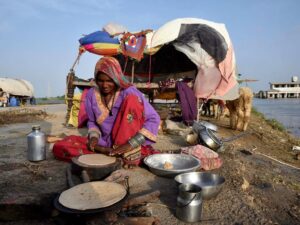This piece was co-authored by Joie Chowdhury, Program Coordinator for Environment and Economic, Social and Cultural Rights at ESCR-Net — International Network for Economic, Social and Cultural Rights; Lien Vandamme, Senior Campaigner at the Center for International Environmental Law (CIEL); and Heidi White lawyer and independent consultant working with the Loss and Damage Collaboration (L&DC). It was cross-posted on the L&DC website.
The climate crisis is a human rights crisis. It is abundantly clear that the devastating climate impacts we are experiencing today are leading to both the destruction of our ecosystems and major human rights harms. In the international climate negotiations, these harms are known as loss and damage. To confront these accelerating impacts, countries at the 27th Conference of the Parties to the United Nations Framework Convention on Climate Change (COP27) must act urgently and decisively to address loss and damage at the scale required, and with a human rights lens. Considering loss and damage in relation to human rights allows us to understand the full range of impacts on communities, and explore concrete avenues to secure redress.
The human rights harms resulting from climate-related disasters are wide-ranging. To consider one recent example, the floods in Pakistan inundated one third of the country, impacting many human rights, including:
- The right to life: the death toll is over 1,500, with 552 children among the dead.
- The right to adequate housing: more than 2 million homes have been damaged or destroyed and over 30 million people are displaced.
- The right to food: 65% of Pakistan’s main food crops have been swept away and nearly 70% of livestock have perished.
- The right to education and health: 23,900 schools and 1,460 health facilities have been damaged and 12,000 kilometers of roads are underwater.
Remedying this loss and damage requires much more than just money, but adequate financial resources are a necessary prerequisite. The cost of flood-related damage in Pakistan is estimated to be USD40 billion. The exorbitant costs of this and other disasters, mainly shouldered by governments and communities in the Global South, put immense pressure on national budgets, hampering the progressive fulfillment of economic, social, and cultural rights.

Historical and present responsibility for the climate crisis lies primarily with wealthy, highly industrialized countries and powerful corporate actors. Yet the countries and people who have contributed the least to the climate crisis, especially Indigenous Peoples, those in the Global South, and racially, ethnically, and nationally marginalized groups, are the hardest hit by its impacts. Ensuring effective remedy for people whose rights have been harmed has long been neglected in international climate negotiations. As the Special Rapporteur on human rights and climate change put it in his most recent report to the UN General Assembly, “the major emitting countries have abandoned their duty to cooperate in line with the principles of international cooperation.”
International human rights bodies and national courts have confirmed the obligations of States to protect affected individuals and communities from climate-induced human rights harms, domestically and extraterritorially. In some cases, there have been direct references to loss and damage, such as in a joint statement by five UN treaty bodies declaring that “States must cooperate in good faith in the establishment of global responses addressing loss and damage suffered by vulnerable countries.” International cooperation and accountability are essential ingredients for ensuring that all people harmed by the climate crisis have access to effective remedy. Other key human rights principles to realize this are: access to information, public participation, access to justice, substantive equality, and preventing and redressing intersectional discrimination.
At COP27, Parties must translate these principles into concrete, rights-based solutions to address loss and damage across multiple technical tracks, with a focus on both substantive and procedural elements. This includes the creation of a Loss and Damage Finance Facility that can ensure new and additional finance for loss and damage that is needs- and rights-centered, public and grant-based, and gender-responsive.
In addition, COP27 must push progress towards a rights-compliant implementation and operationalization of the Warsaw International Mechanism, the mechanism that was set up under the climate negotiations to avert, minimize, and address loss and damage. This includes guiding a rights-based implementation of the new work program of the mechanism’s Executive Committee, and the operationalization of the Santiago Network, a network aimed to provide technical assistance to developing countries. Integration of loss and damage and human rights will also be important in other work streams at COP27, such as the post-2025 climate finance goal (New Collective Quantified Goal), the Global Stocktake, and the Gender Action Plan. To learn more about these work streams, read our full briefing: “What does a human rights-based approach to addressing loss and damage look like?”
As climate impacts escalate, the reaffirmation made by Parties to the Paris Agreement to respect, promote, and consider their human rights obligations when taking climate action is more relevant than ever. The failure of countries, particularly those bearing historical responsibility and with the most available resources, to phase out fossil fuels and reduce emissions, provide adequate support for adaptation, and meaningfully address loss and damage is causing immense human suffering and is not compliant with international human rights obligations. With ample options now on the table to finally address loss and damage, changing course at COP27 is only a matter of political will.
This blog was posted on November 2, 2022.
